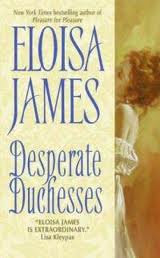Desperate Duchesses, by Eloisa James
Jun 5
2007

Romance novelist and Shakespeare professor Eloisa James clearly wants her books to push the boundaries of the romance genre. But while originality is a commendable goal, it’s usually a good idea to actually master a form before you start screwing with it—and James is still a long, long way from mastering romance writing. Her most recent novel, Desperate Duchesses, is well written, carefully researched, and full of interesting facts about chess, but it’s a far cry from being an effective love story.
Set in the late 18th century, the heroine of Desperate Duchesses is Lady Roberta St. Giles, a young lady with a loving but eccentric father—a parent who’s more interested in publicly proclaiming his devotion to his déclassé mistress (Mrs. Grope) or loudly reciting his avant-garde poetry (which James borrowed from the little-known 18th century poet Christopher Smart) than in planning for his daughter’s future. When Roberta forms an instant crush on the Duke of Villiers, she travels to London in hopes that her distant cousin, the Duchess of Beaumont, will help her with her campaign to marry him. While the Duchess is willing, Roberta’s plans go awry when she discovers that Villiers is a chess-obsessed rakehell with little interest in well-bred country girls, her embarrassing father follows her to London, and she just can’t seem to stop flirting with Damon, the Earl of Gryffyn.
Desperate Duchesses’ biggest flaw is the lack of drama between its main characters. Roberta and Damon cheerfully enjoy one another’s company from start to finish, and the only real obstacle to their romance is Roberta’s juvenile crush on Villiers (a character clearly intended to be the “purring villain” type, but who comes across as an aging, creepy, self-indulgent jackass). Romances don’t have to be angst-filled—my all-time favorite romance novel, Georgette Heyer’s Cotillion, features a delightfully sunny relationship between its hero and heroine—but if you don’t use melodrama to fuel your plot, you need something to take its place. James attempts to make up for the lack of tension between her main couple by focusing on the roiling passions of her minor characters (who will one day star in their own books), but as none of those storylines are resolved in this novel, readers are left paying $6.99 for a book that consists of one weak dramatic storyline and a bunch of dangling plot threads.
James’s success continues to frustrate me. She’s a competent writer who has trotted out twelve historically accurate, fairly entertaining romance novels, but her books are proof positive that possessing a good research assistant and the ability to string together a coherent sentence doesn’t guarantee a great—or even above-average—romance novel. I’ll keep buying her books when I’m stuck in airport and there’s nothing better to read, but I’m not going to stop complaining about her undeserved level of fame until she writes a book that’s as at least half as good as Lisa Kleypas’s weakest effort.
Set in the late 18th century, the heroine of Desperate Duchesses is Lady Roberta St. Giles, a young lady with a loving but eccentric father—a parent who’s more interested in publicly proclaiming his devotion to his déclassé mistress (Mrs. Grope) or loudly reciting his avant-garde poetry (which James borrowed from the little-known 18th century poet Christopher Smart) than in planning for his daughter’s future. When Roberta forms an instant crush on the Duke of Villiers, she travels to London in hopes that her distant cousin, the Duchess of Beaumont, will help her with her campaign to marry him. While the Duchess is willing, Roberta’s plans go awry when she discovers that Villiers is a chess-obsessed rakehell with little interest in well-bred country girls, her embarrassing father follows her to London, and she just can’t seem to stop flirting with Damon, the Earl of Gryffyn.
Desperate Duchesses’ biggest flaw is the lack of drama between its main characters. Roberta and Damon cheerfully enjoy one another’s company from start to finish, and the only real obstacle to their romance is Roberta’s juvenile crush on Villiers (a character clearly intended to be the “purring villain” type, but who comes across as an aging, creepy, self-indulgent jackass). Romances don’t have to be angst-filled—my all-time favorite romance novel, Georgette Heyer’s Cotillion, features a delightfully sunny relationship between its hero and heroine—but if you don’t use melodrama to fuel your plot, you need something to take its place. James attempts to make up for the lack of tension between her main couple by focusing on the roiling passions of her minor characters (who will one day star in their own books), but as none of those storylines are resolved in this novel, readers are left paying $6.99 for a book that consists of one weak dramatic storyline and a bunch of dangling plot threads.
James’s success continues to frustrate me. She’s a competent writer who has trotted out twelve historically accurate, fairly entertaining romance novels, but her books are proof positive that possessing a good research assistant and the ability to string together a coherent sentence doesn’t guarantee a great—or even above-average—romance novel. I’ll keep buying her books when I’m stuck in airport and there’s nothing better to read, but I’m not going to stop complaining about her undeserved level of fame until she writes a book that’s as at least half as good as Lisa Kleypas’s weakest effort.
Posted by: Julia, Last edit by: Julianka
No new comments are allowed on this post.
Comments
No comments yet. Be the first!